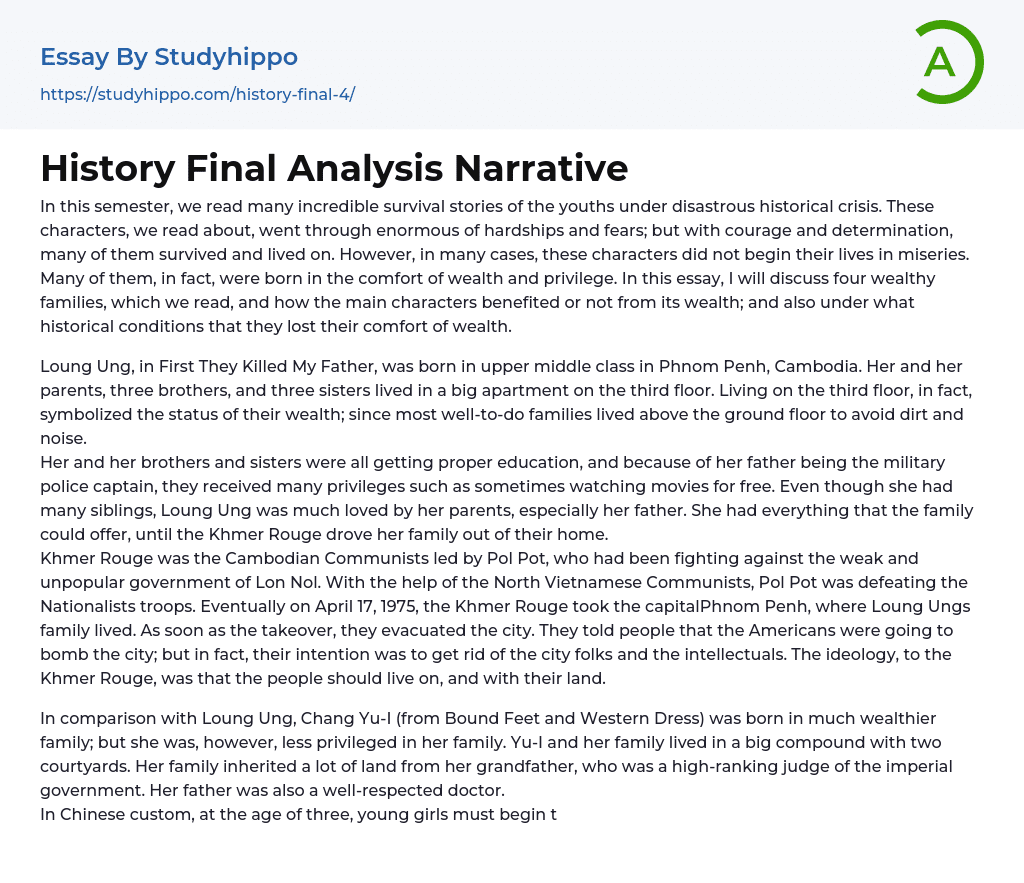Throughout the semester, we delved into the remarkable tales of young individuals who endured and triumphed over harrowing historical calamities. These characters exhibited exceptional bravery and resolve despite enduring immense adversity and dread. What's intriguing is that not all of them hailed from impoverished backgrounds - quite the contrary, some were born into affluent and privileged families. In this essay, I will delve into four such families we encountered in our readings, analyzing how their affluence impacted the protagonists' lives and how they relinquished their privileged existences in diverse historical settings.
Loung Ung was born into a privileged family in Phnom Penh, Cambodia. Their residence on the third floor of a spacious apartment symbolized their wealth and social status, as they sought to avoid dirt and noise.
Thanks to her father's position as the military police captain,
...Loung Ung and her siblings enjoyed certain privileges such as access to education and free movie screenings. Despite having numerous siblings, she held a special place in her parents' hearts, particularly her father. Her family provided everything they could for her until they were forcibly displaced from their home by the Khmer Rouge.
The Khmer Rouge, led by Pol Pot, were Cambodian Communists who fought against the unpopular Lon Nol government with support from North Vietnamese Communists. On April 17, 1975, they seized control of Phnom Penh where Loung Ung's family resided. They swiftly evacuated the entire city under false pretenses of an imminent American bombing; however, their true intention was to eradicate urban residents and intellectuals. The Khmer Rouge adhered to a philosophy centered around self-sufficiency through living off and with the land.
Chang Yu-I, from Bound Feet and Western Dress
grew up in a significantly wealthier family compared to Loung Ung. Despite this, she had less privilege within her own family. Yu-I and her family resided in a sizable compound with two courtyards, having inherited a substantial amount of land from her grandfather, an esteemed judge in the imperial government. Additionally, her father was a respected doctor.
In accordance with Chinese tradition, girls as young as three years old were subjected to the painful practice of foot binding, as men in Chinese society considered small feet to be desirable. However, Yu-I was spared from this fate due to the intervention of her second brother. Furthermore, her father held different expectations for his sons and daughters. While all eight of Yu-I's brothers received extensive education, the same opportunities were not afforded to the daughters, including Yu-I. Her father believed that education was of no use once a girl got married. Although Yu-I managed to persuade her father to let her attend school, she was compelled to leave prematurely due to her engagement to a wealthy family belonging to the Hus.
In the novel Wartime Lies, Maciek's father held the prominent position of town physician in T., Poland. Being associated with the elite members of the town was not uncommon for Maciek and his sister Tania due to their father's profession. Moreover, they had servants such as cooks and laundresses, thus enjoying a comfortable lifestyle. As an only child, Maciek was pampered and occasionally utilized vomiting as a form of protest against Tania.Maciek's health condition necessitated special care, highlighting their affluent status as they were able to access a fee-based beach.
Maciek and his family had a privileged and
comfortable life until the Russians took his father away when the Germans overran eastern Poland in 1939. Because they were Jews, the Germans forced them to leave their home, marking the beginning of their unfortunate misery.
The author of the Wild Swans did not come from a wealthy family, but her family still enjoyed undeniable privileges. In China, both of her parents joined the Communists in the early years before the Long March. After the Communists took control of China, her father became a highly important senior official in his province, and her mother was responsible for entertainment in that region. As a result, the author grew up among the children of the elite. However, like other children, she was obligated to participate in community work, such as collecting steel.
Unfortunately, their privileged life was soon taken away when her father openly criticized Mao's backyard furnaces. These furnaces were intended to collect scrap metals and melt them into steel for industrial use. However, the project failed miserably and resulted in mass famine in China. In 1965, during the Cultural Revolution, both of her parents were labeled as black class enemies due to their senior official positions. They were subjected to numerous denunciation meetings and frequent detentions.
Bibliography:
- Russian Empire essays
- Ancient Greece essays
- British Empire essays
- Historical Figures essays
- Nazi Germany essays
- Roman Empire essays
- War essays
- Revolution essays
- 19Th Century essays
- Historiography essays
- History of the United States essays
- 20Th Century essays
- World History essays
- Vikings essays
- Declaration of Independence essays
- Civilization essays
- Evidence essays
- Genocide essays
- Colonialism essays
- Rebellion essays
- 1960S essays
- 1920S essays
- 1950S essays
- Letter from Birmingham Jail essays
- Louisiana Purchase essays
- The Columbian Exchange essays
- World Hunger essays
- What is History essays
- Bravery essays
- Gilded Age essays
- Vladimir Lenin essays
- Alexander The Great essays
- Sparta essays
- Victorian Era essays
- Henry v essays
- Stonehenge essays
- Frederick Douglass essays
- Mahatma Gandhi essays
- Joseph Stalin essays
- Geert Hofstede essays
- George Eliot essays
- Ginevra King essays
- John Keats essays
- Siegfried Sassoon essays
- Ben jonson essays
- Billy elliot essays
- Wilkie collins essays
- John Proctor essays
- Harriet Tubman essays
- Napoleon essays




